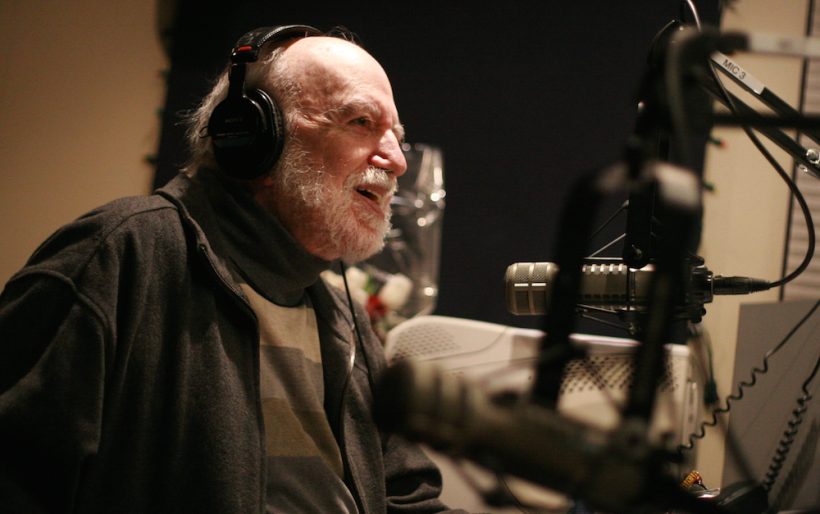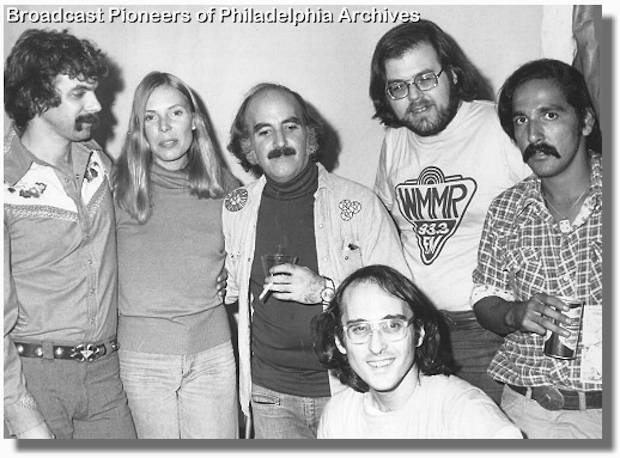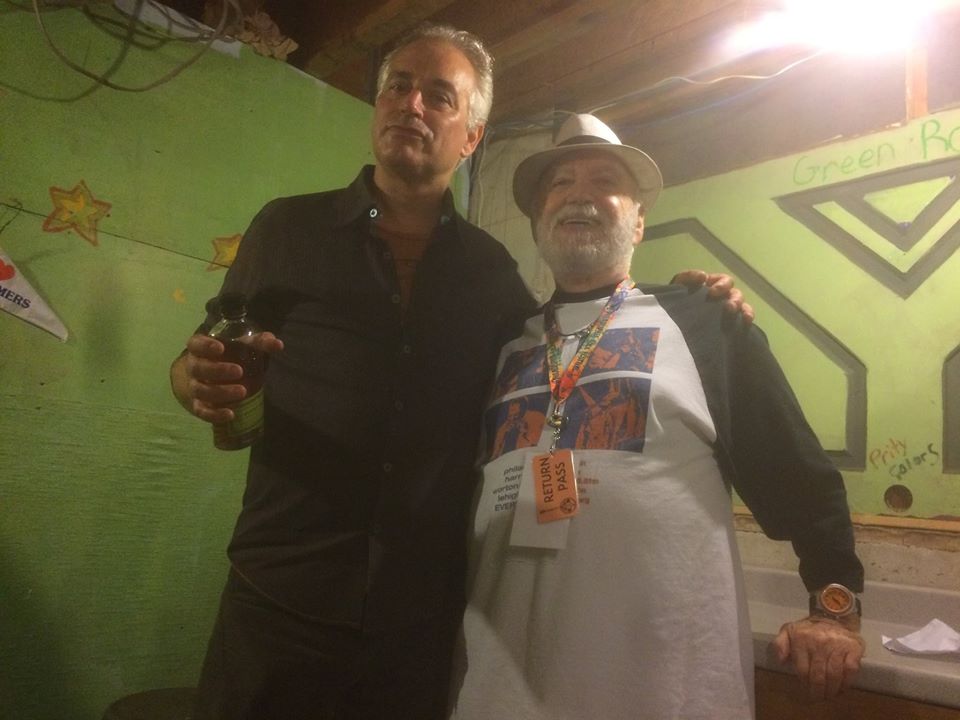
Gene Shay | photo by John Vettese for WXPN
Remembering Gene Shay, legendary Philadelphia folk DJ
Update: 4/18/20 5:20 p.m.: WXPN has just received word from Gene Shay’s Family that he has passed on at the age 85. Gene’s son in law, Tom Vaughan, also shared via facebook: “So sorry to report that Gene Shay peacefully passed away yesterday, heading to join his wife Gloria in that great folk festival in the sky. The family will have a private burial, but a celebration of life will be planned as soon as that is possible.”
David Dye will be hosting a one-hour tribute on Sunday, April 19 on WXPN at 11 a.m. And later, a Folk Show Tribute, hosted Ian Zolitor starting at 8 p.m.
Gene was the voice of a music community for over 50 years, a celebrator and curator of folk music on the airwaves and an eager supporter of it from the stage.
Born Ivan Shaner in in 1935, Shay debuted on Philadelphia radio in 1962 at WRTI, and hosted the Folk Show on WXPN from 1995 to 2015. He held down shifts on a spectrum of Philly radio stations in the years between, and was a driving force behind the Philadelphia Folksong Society and its annual Folk Festival. But his musical pursuits were initially a hobby, a side hustle. Shay’s primary career from the 50s through the 90s was at a variety of commercial ad agencies, including Philadelphia’s Elkman Advertising Agency.
His quick wit and irreverent sense of humor were an asset in a field where his job was literally to get people’s attention. In a 2013 interview, Shay recalled keeping a tape recorder in the desk drawer of his office, secretly hitting play during meetings and freaking clients out when a cartoonish voice began to plead “Let me out of here!” He also had an eye for design and marketing, and speaks proudly of two iconic Philly brands he had a hand in developing: the Philadelphia Folk Festival’s smiling banjo avatar, and name of XPN’s NPR-syndicated program World Cafe.
On-air, Shay had a formidable resume. He got his start on Armed Forces Radio while stationed at a thirteenth century castle outside of Frankfurt in the small town of Heochst. Returning to Philadelphia, he landed a post at WRTI at Temple, later getting an afternoon slot producing a jazz show on WHAT and taking over their folk show. In 1968, Shay launched his long-running Sunday eve Folk Show on WDAS. It moved over to WMMR in 1970, to WIOQ in 1976, to WHYY in 1981 and finally to WXPN in 1995.
The impact and influence of that show cannot be overstated. Joni Mitchell famously wrote her song “Both Sides Now” during downtime when she was playing two nights at Sansom Street venue The Second Fret, and premiered it with an acoustic performance for Shay and his listeners on the WDAS airwaves.
Former World Cafe host David Dye listened as a teenager growing up in the Philadelphia region, and recalled in a 2015 interview that “Gene’s interviews allowed you to eavesdrop on what sounded like a great party every week,” Dye says. “Hands down, I learned more about music from Gene Shay than from any other source. Tuning in Sunday night to ‘HAT or ‘DAS in the mid 60’s was going to school.”
Shay also, through the Folksong Society, helped book Bob Dylan’s first-ever Philadelphia show on May 3, 1963, at the Philadelphia Ethical Society on Rittenhouse Square. His story about that is that only about 45 people were in attendance, Dylan “received $150 for this gig and he was such a sweet person.”

Outside his role on the air, Shay was a driving force across much of the Philadelphia Folksong Society’s lifespan, co-founding the organization’s Philadelphia Folk Festival with David Hadler in 1962 and helping it work its way across a variety of locations — from its first three years at Wilson Farm in Paoli, to one year at Spring Mountain in Schwenksville, and its home since 1967 at Old Pool Farm in Upper Salford. He’s a past president of the Folksong Society’s board, and MC’d the festival annually up until 2016.
Onstage at Fest, Gene became a beloved presence, keeping the show moving between acts with sardonic quips and corny jokes — initially culled from his own jokebook, and as the years went on, sourced from the crowd. When he spoke to The Key in 2013 about the craft of MCing, he explained how the seemingly unrehearsed approach to telling jokes, even bad ones — especially bad ones — was quite an intentional means of easing transitions onstage.
“Cornball jokes, getting groans, anything to lighten up the moment. Sometimes the crowd is out there in the cold, sometimes in the rain, sometimes waiting much too long for a stage set to get changed up.”

Jesse Lundy of Point Entertainment co-programmed the Folk Festival for a decade from the mid-00s to mid-teens; he first met Shay in the mid-90s, when Shay would attend shows at Lundy’s Bryn Mawr venue The Point, and Lundy would pop in at Folk Fest each year, and says that over time Shay transitioned with ease from being an icon to a friend. “For the 10 years that we booked Folk Fest, Gene and I worked very closely discussing acts to be booked and on things he could discuss from stage when emceeing the event,” he recalls. “I’d have to say Gene might be the last of his generation in the radio world of Philadelphia, and he was the personification of what folk music meant in Philadelphia.”
When Shay retired from the air in 2015, past president of PFS Michael Braunfeld praised the breadth and depth of Shay’s knowledge — “We’d tune in [to his radio show] and he’s be playing music that the rest of us were unfamiliar with, as keyed-in as we were.” — and spoke of the impact of Shay’s support had on artists, whether from airplay, live performances on his show or simply a quote. “You have no idea what things like that can do for the confidence of emerging performers,” he said.
For Shay’s part, he told us that Folk Fest served as a vehicle for discovery year after year, a way to keep his vast mental musical database as current as can be. “I’m right there watching from the side of the stage,” he said. “If I like somebody, I’ll grab them afterwards and say ‘hey, when’s the next time you’ll be in Philly? Want to be on the radio?’”
Beyond his two main musical commitments, Shay also served as Governor of NARAS (the National Academy of Recording Arts and Sciences), as well as a board member of The North East Regional Folk Alliance and The First Person Arts Foundation. He served as an advisor and charter board member of the North American Folk and Dance Alliance, Sing Out! Magazine, the American Composers’ Forum and The Philadelphia Music Alliance.
He received lifetime achievement awards from the Delaware Valley Music Poll, The Extreme Folk Festival and in 2014 was honored by his alma mater Temple University with the Lou Klein Award for distinguished work in media. At the same ceremony he was inducted into Temple University’s Radio, TV and Theater Hall Of Fame. In 2013, Shay was honored with a plaque on the Philadelphia Music Walk of Fame.
When Shay retired from the Philadelphia airwaves in 2015, he went out with a hit parade of archival interviews drawn from his 50 years on the air, spread out over a month of Sundays — listen to an interview with Joni Mitchell from 1967 here — and for his final show, 111 musicians from the Philadelphia folk community surprised him in the performance studio to sing “Turn, Turn, Turn” and “Will The Circle Be Unbroken?”. Watch those videos below, and see a photo essay of Gene’s final broadcast here.
Gene resided in Lower Merion with his wife of over 50 years, Gloria Shaner, who passed in May of 2018; Gene’s two daughters and their families remain with us, as well as his formidable influence on the music community.
As the Folk Show’s Ian Zolitor writes: “What separates Gene from the rest is how he relates [his] stories to others. There is no ego involved at all. He doesn’t lament on days past and he certainly doesn’t brag. He doesn’t demand credit for the hundreds of musicians he’s helped out along their way to success (although credit is certainly due!). For Gene, it was clearly always about the love of the music. That was the driving force behind it all. That is how I will remember him, and that is his biggest lesson that I will keep with me forever.”
David Dye reflects both on Shay’s ubiquity, as well as his profound influence: “I suppose we all fooled ourselves that Gene would always be there. He has been in so many ways. Personally I have long said that without his example I would never have had the type of career I have enjoyed. But more than that, I have learned so much about music thanks to Gene.”

PREVIOUS UPDATES TO THIS ARTICLE:
*EDIT 10:30 a.m. 4/15/20: Though the Folksong Society shared this morning, and confirmed with XPN’s Bruce Warren, that Shay had passed away, members of Shay’s family have since reached out to say he is actually in hospice care, and has not passed. We will post updates as we receive them.
*Originally Reported on 4/15 at 8:15 p.m.:
We are sad to learn that Philadelphia’s Gene Shay — the voice of a music community for over 50 years, a celebrator and curator of folk music on the airwaves and an eager supporter of it from the stage — has passed away at age 85 *is on hospice care from complications surrounding COVID-19. He had been hospitalized for the past few weeks, and this morning the Philadelphia Folksong Society shared the news that “the Grandfather of of Philadelphia Folk Music, Dean of America folk DJs, Emcee of the Philadelphia Folk Festival… our Gene, passed away overnight.”